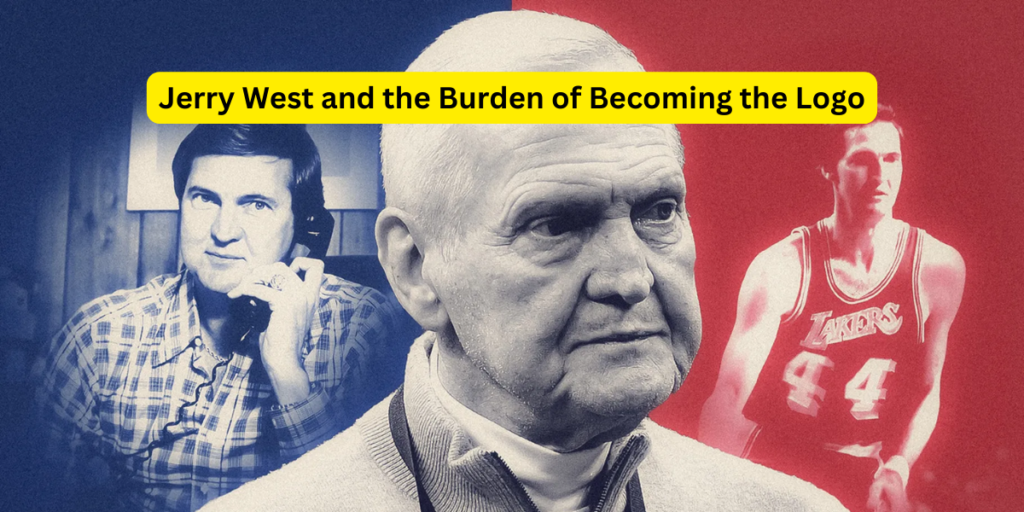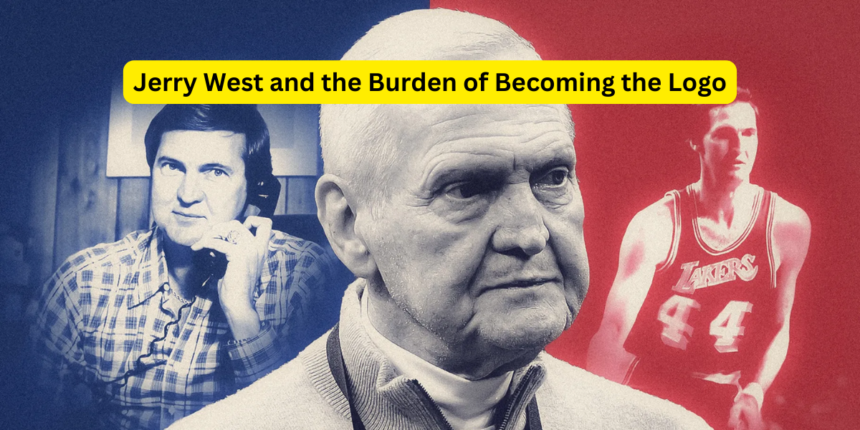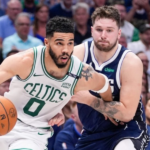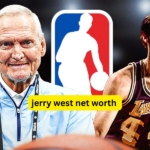Mr. Clutch was such a defining figure in NBA history that the league dubbed him its emblem, yet the Hall of Famer could never escape the weight of being the bar for perfection.
Jerry West and I first met in the summer of 1997, when I was a young, bashful, and maybe inexperienced rookie beat journalist assigned to cover the Lakers for the Los Angeles Daily News. I knew his resume, the titles he had won (and lost), the crucial shots he had made, and the contenders he had built. But I don’t believe I truly comprehended the man until three summers later.
It was June 20, 2000, the morning after Kobe Bryant rushed into Shaquille O’Neal’s arms, purple and gold confetti whirling around them, to celebrate their first NBA title. It had been 12 years since the team had raised its banner. It’s been four years since West lured the two stars to Los Angeles, putting them at risk. His notion of a Lakers resurgence had become a reality.
I discovered West in his poorly lit office at Lakers headquarters, seated at his desk. He invited me in and offered to answer a few questions. I started with the most obvious question: Did you enjoy the night?

“No,” he said flatly, “I didn’t. I didn’t watch.”
West wasn’t even present. He’d spent the Game 6 clincher in his vehicle, travelling about Los Angeles and receiving information by phone. The prospect of witnessing in person was too stressful and upsetting. He promised me he’d watch the entire series on video someday. Over the following 20 minutes, West would declare he “felt happy” for the fans, Shaq and Kobe, Phil Jackson, owner Jerry Buss, and even the team’s scouts, mentioning each of them by name. But he didn’t appear happy at all. So I pressed again: How about you? Is there any sense of satisfaction after everything you’ve gone through, all the second-guessing, criticism, and doubts?
“Not for me,” he said.
Until that time, I knew West as a basketball genius, a living legend, an embodiment of Lakers perfection, the rare superstar player who’d evolved into a superstar executive, universally revered and adored. He was Mr. Clutch. He was the emblem, as in the actual NBA emblem (although the league has disputed this for decades). I knew he could be passionate, frightening, kind, insightful, sympathetic, gossipy, sweet, cantankerous, occasionally defensive, and strangely insecure. But the weight of being Jerry West had never truly hit me until that moment.
West, who died on Wednesday at the age of 86, outperformed 99 percent of all NBA players, coaches, and executives. However, it seems that the enjoying portion was the most difficult. No number of triumphs, banners, or free-agent coups could ever satisfy him. He heard criticism louder than appreciation. It was as if being the Logo demanded a degree of perfection that he could never achieve. It was as if all of his anguish as a player—one title versus eight Finals defeats—had left him so wounded that he was always prepared for the worst.
So, no, West couldn’t stand to see any of the 2000 Finals live, and finally couldn’t bear to be present at all.
Two months after the Lakers won the championship, West left the team without a news conference, proper farewell, or explanation. However, as his old buddy (and Lakers broadcaster) Chick Hearn stated that day, “He feels the pressures are tearing him down physically as well as mentally.” We would hear that he felt undervalued. We’d hear he was furious because Jackson was dating Buss’s daughter Jeanie, who was then a team executive. We’d find out later about a heart problem.
West was the essence of the troubled genius, an intensely competitive and obsessive perfectionist whose every accomplishment appeared overshadowed by his own high standards. We knew the fundamentals: nine Finals as players, but only one title (in 1972).
As an executive, West presided over the Showtime period before establishing a new dynasty around Shaq and Kobe. Despite the fact that he left before they won their second and third crowns, his fingerprints are on all of those flags. He would resuscitate the languishing Memphis Grizzlies before becoming a pivotal factor in the development of the Golden State Warriors dynasty. He is one of the finest club executives in sports history. It’s fair to say West took delight in it all, but it’s unclear how much he genuinely appreciated any of it.
This is not to imply that West did not like the game itself. The man was a true gym junkie, attending pre-draft workouts and NBA summer leagues far into his 80s. Over the last 20 years, he has been a silent confidant to scores of rising superstars, many of whom have never played for any of the teams he has worked for. Rivals may call it meddling. But it was the stars who sought out the West. And West felt an unwavering commitment to the game and the generations who followed him to offer any advice he could.
He was just as ready to receive calls from reporters who wanted his advice and thoughts, or to just discuss the newest rumours. Officially, West told me back in 1997 that he would not comment off the record. Unofficially? West was an insatiable gossiper and a beautifully open truth teller. He would tell you right away if a supposed celebrity was overrated (and he was usually correct). He’d chastise you for labelling a player as “great,” because the word is overused (he was also correct).
And, despite his objections about his portrayal in the HBO miniseries Winning Time, West had a fiery temper and a fondness for F-bombs.
While leading the Grizzlies, West once left a lengthy, profanity-laced rant on a beat writer’s voicemail. Then enthusiastically signed off, stating, “You may call me back in the office tomorrow. Bye-bye.” “He was incredibly sweet,” said Ron Tillery, The Commercial Appeal’s Grizzlies writer. Tillery stated that the two continued to speak at least twice a year till the end.
The point is that West wasn’t being cruel or frightening; he was simply extremely proud and enthusiastic about the league he’d aided construct.
West liked the game so much that he accepted the Memphis position at a time when the Grizzlies were regarded as one of the worst clubs in professional sports. He undoubtedly placed the club on the map by leading the Grizzlies to their first three playoff appearances—and chafed when local media lauded that small accomplishment.
But West remained a Laker for life, serving as a buddy and mentor to Kobe and (separately) Shaq even after he left. On one visit to Memphis early in West’s term, he showed me his wristwatch, which was still set to Pacific time.
Tensions with the Buss family, particularly Jeanie, most likely prevented West from ever returning the team that defined him (and helped him). Instead, he would serve as a consultant to the Warriors (where he helped recruit Kevin Durant) and, later, the Clippers (where he helped recruit Kawhi Leonard). The game evolved, but West remained an oracle of basketball wisdom because he welcomed change.
It wasn’t until 2011, when his autobiography, West by West: My Charmed, Tormented Life, was published, that we completely understood the scope of his emotional suffering and trauma. His father physically abused him as a youngster.
“There are some things you keep hidden forever because you don’t want people to know about you,” West told a group of 125 students last July at the Sports Business Classroom, an outgrowth of the NBA’s summer league. Then he proceeded to tell them about those things in an hour-long talk that was raw, challenging, and emotionally charged. “I’m flawed,” West remarked, “because of the things I saw growing up.”
“They laugh at what I said. “It is the truth,” he stated. “Have you ever heard a wolf howl?” How eerie is that sound? Haunting, isn’t it? … It’s your thoughts on attending those games. I was going to murder the dog. I wanted to earn his respect as a player, but I also knew I couldn’t give in. I’ve been a wolf my whole life. And I’ve got to be in my own way to survive.”
The world applauded Jerry West for everything he accomplished and represented throughout the years, even when West couldn’t bring himself to do so. Perhaps West never felt deserving of all the accolades.
Disclaimer: Our website name stands Udroppy for Basically, we focus on Scholarships, Courses,Jobs, Entertainment, and Celebrities, etc. Udroppy.com is not related to any government body. We are not affiliated with any government body or corporation. Our purpose is solely to provide news coverage and updates across various topics.








